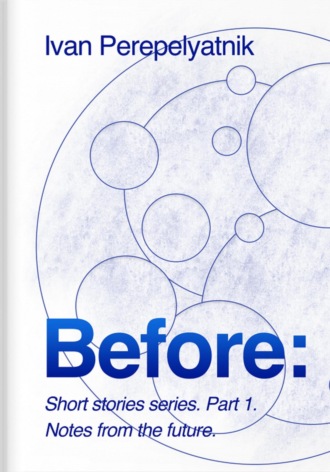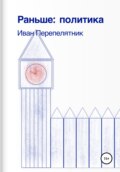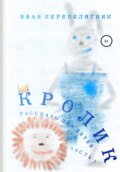
Иван Перепелятник
The Before Short Story Series. Part 1
‘Hi, Bo,’ Lewis held out his hand, and then Meryl greeted him too. ‘Glad to meet you.’
‘How did you get to El Paso? Are you tired at all?’
‘It’s fine, Bo!’ Meryl replied cheerfully. ‘What’s next on the program? May we have the details please.’
‘Yes, of course, Mrs Podger.’
‘My last name is Stern. I didn’t take my husband’s last name,’ Meryl corrected him.
‘Oh, I’m sorry, Mrs Stern. In the documents both you and your husband are listed as Podger. I will definitely make the required corrections.’
‘No problem, dear. It’s all right. I remember my husband’s last name, of course, but mine is Stern. You may call me Meryl. And Mr Podger is Lewis.’
‘Thank you, Meryl. The main program we’re having for today is as follows. It’s lunchtime now and I’m glad to have the opportunity to offer you lunch at our magnificent Como restaurant, where Chef Peter is cooking. He has two Michelin stars! I hope you will like his cuisine.’
‘I have no doubt at all, dear. And what’s next?’ The three of them walked up to the elevator in the spacious hotel lobby.
‘Next, I am ready to give you a personal drone tour of the spaceport complex. After that, we will offer you a short briefing and an interview with a doctor. And the time to be ready for the start will come. At 17:30, all passengers should be already in their seats in the spaceship.’
‘Lunch, excursion, doctor, briefing, start—is that right, Bo?’ said Lewis.
‘That’s right, sir!’
‘Great. I suggest we do it this way. Right after lunch, Bo, please come over. We’ll be waiting for you,’ Lewis and Meryl stopped in front of the door to the room.
‘All right, Mr Podger. The restaurant is on the 17th floor. Two floors below.’
‘We’ll order a room service. Thank you, Bo,’ Meryl answered, opening the door.
‘I’ll send a waiter right away for you, Mrs Stern.’
A little more than an hour later, a four-seat drone, buzzing heavily, lifted the three passengers into the sky. It was quiet in the cabin—nothing distracted from conversations and exploration of the sights of the America spaceport. The drone took a position at the altitude of 500–600 meters, the most convenient observation level to watch what was happening below, on the grounds of the complex.
The security in the airspace of the spaceport was the function of a dispatcher control system. The movement of flying objects in the perimeter of the complex or approaching it was monitored online. Nothing should be missed, and all actions should be coordinated. Spaceships starting from the site and coming back, transport and passenger planes, sightseeing drones and security drones, even birds—the system was recording and tracking the movement of all the objects in the sky. If necessary, amendments were made to flight plans or to the sequence of take-offs and landings. Security drones interacted with biological objects, as birds were listed in the system, driving away flocks and single individuals. Accidents were unacceptable. The price of a mistake meant, at best, multimillion dollar losses. No one even thought about negative scenarios, preventing such extreme situations.
‘The Equilibrium spaceship will take off now from runway No. 1—please look to the right,’ Bo pointed with his hand.
Meryl and Lewis turned curiously in the direction indicated by the steward. At the beginning of the runaway strip, the spaceship was waiting for the command to take off. The disproportionately large diameter of the ship’s hull in comparison with the relatively short wings raised doubts about the possibility of fulfilling the first stage of the flight plan—to take off.
The drone with passengers was hovering at a safe distance from the runway. Lewis noticed a dozen more flying vehicles hovering in the air and eagerly awaiting the performance to start. They were watching the event from a perfect angle, as if they were sitting at home in the living room.
The propulsion system of a spacecraft consisted of two main parts. To accelerate and get off the runway, accelerators built into the wings were primarily used. Their position, the inclination relative to the wing, was adjusted depending on the take-off stage. At the beginning, the position of the engines was fixed in parallel to the ground. As the speed increased, the angle changed so as to more quickly provide the required lift to get off the ground, compensating for the short wing geometry and the heavy weight of the spacecraft. The tail engines at this stage performed only an auxiliary role. When reaching the stratosphere, at the level of 15,000 meters, the main accelerating engines were started to enable exit to outer space. The creation of such a shuttle spacecraft capable of taking off independently, going into outer space and smoothly descending into the atmosphere of the planet, landing on the runway, would be impossible without the involvement of the power of the PAX quantum computer. Artificial intelligence helped to perfect the early development of space shuttles, increasing their operational characteristics, reliability and safety. A solution was also found to one of the key tasks hindering the development of space travel—an efficient fuel and propulsion systems were developed. Previously, placing a payload into the Earth orbit was expensive, entailed significant time for preparation, and in addition caused damage to the environment. Fuel liquefaction to high degree and a hybrid accelerator system combining the potential of nuclear and classic jet engines—the solution suggested by PAX, allowed humanity to take the next step in space exploration. Theoretically, a fully fueled spaceship could take off and land twice without refueling and additional maintenance. A technological breakthrough determined the possibility of incredibly rapid development of space tourism as well, which gave impetus to the entire industry. The economy, as had been always before, served as the main sponsor and motivator of progress.
The booster engines of the spaceship, which Meryl and Lewis were watching, started working at full power. Clouds of dust rose. The spaceship began accelerating rapidly and after 10-15 seconds it took off into the air, starting the flight. After a couple of minutes, the Equilibrium had already turned into a dot that could only be tracked by the thin white trail left by the engines.
‘It looks a little casual somehow,’ Lewis looked at Meryl. ‘Don’t you think so, Meryl?’
‘I’m really glad about that, Lewis. Imagine the roar of engines, clouds of exhaust gases, crowds of cheering people greeting the start… To be honest, I would not be ready to go to such a feat—to be on board a rocket, the successful launch of which causes such a storm of emotions and delight. So it’s wonderful that it’s an everyday routine.’
Bo smiled. The tour continued further on.
‘There are four operating runways in the spaceport: two for airplanes and two for spaceships. At the moment, two more are under construction—one for each of the assignments. Every year the number of launches is coming up. Over ten years, we would expect that spaceships will take off at least once per hour. That is, it will double. Taking into account the need for backup strips, we will put into operation at least another one, plus these which construction has already started. Such indicators as the number of projected launches, the overall increase on the load of the spaceport, imply putting into operation new terminals.
Here, on the site to the right, below us,’ Bo pointed at the vacant plot already prepared for construction under the drone, ‘the fifth terminal for servicing tourists will be built in the very near future. Moreover, I am glad that I can tell you about one of the new and unique projects that our company is currently developing. Work is underway at the final stage now, to launch a new route: Earth–Venus! Just imagine an amazing space trip to our sister Venus!’ Bo said solemnly.
‘The guy is overacting a little…’ Meryl thought and answered:
‘Bo, by this time I will probably be another exhibit in the family columbarium. And on the other hand, you can’t land on Venus. What will tourists do there?’
Mrs Stern, I have no doubt that after the lunar program, you will definitely decide to fly to Mars and Venus when this new amazing travel destination is opened. We would expect this route to provoke no less interest than flights to Mars. As for the travel program, you are right, it really will not work to land on the surface. But to observe the atmosphere of the planet with your own eyes, to see its surface from the orbit with the help of scientific instruments, to take part in a number of unique experiments—all this is very much in demand now with our space travellers. In addition, the program of the flight to Venus will include the study of our star—the Sun. The orbit of Venus comes much closer to the Sun. It will be a unique experience.
‘Thank you, Bo, for your optimism and for the advertising. Who knows, maybe Lewis and I getting on in years will really become active space explorers of the solar system. Let’s see how our first lunar journey ends.’
Off we go!
A signal, preceding an announcement sounded in the cabin:
‘Dear passengers, we are ready to start. The flight will start in a few seconds. Please make sure that your seat belts are fastened, that you have put your hand luggage on the shelf above your seat. All your belongings must be put away and securely fixed.’
Meryl took Lewis’s hand (he was sitting to her right, by the aisle between the passenger seats) and squeezed it hard. Lewis was no less tense.
‘Meryl, don’t worry. It’s okay,’ he whispered in her ear. ‘Statistics show that yet there hasn’t been a single incident related to the new generation of spaceships. And they have been flying for over 10 years now.’
‘You’ve found the words to calm me down, Lewis. There hasn’t been yet—we can be part of that very first case.’
‘Everything will be fine.’
The whole machine suddenly began accelerating. Fastened with five-point seat belts, they were pressed into their seats. A few seconds and they felt lifting off the ground. In the porthole, the earth was rapidly moving away. A couple more seconds and the clouds were also left behind. The monitor flashed the current speed and altitude indicators, the number of seconds since the start. The scheme on the screen displayed the current stage of the flight: on the monitor, the spacecraft quickly passed the blue zone, approaching the next, saturated blue—the Stratosphere. Bang! A strong push in the back! Everything was shaking and buzzing. Meryl closed her eyes. Her lips moved soundlessly. Hands wet. The ship was breaking out of the grip of the Earth’s gravity.
Lewis looked out the cabin window: ‘Everything is getting black. Somehow I feel bad…’. He wanted to raise his hand to look at the watch—to check the pulse and blood pressure—but he couldn’t. Hands of stone. Would not lift. We’re going out into space! Oh, my God, my God! How scary!’
Everything began to quiet down. The windows went almost black. They were lifted up from their seats. Everything and everyone calmed down. Lewis would love to change. He was sweating all over.
‘Dear passengers, Ezo-4 is reaching outer space. From this moment on, you are astronauts officially! Congratulations to you!’
A calm, pleasant female voice out of the loudspeakers was reassuring the excited passengers:
‘The flight is nominal. The approach time to the international space station Federation and docking will take no more than one hour. You can move freely around the cabin and enjoy the views of the planet Earth. We ask you to be careful when moving around the cabin of the ship in zero gravity. Please show respect to other passengers and maintain order.’
Bucked up everyone, and a commotion began. Having unbuckled from the seats, people began to flounder in zero gravity, trying to move away from their seats. Most of the passengers were adults, but there was no difference from children now.
Launch acceleration, fear and anxiety were replaced by delight, joy and laughter. Someone let water run through the cabin of the ship, which scattered in all directions in transparent, shapeless balls. A boy floated over the heads of Lewis and Meryl, casting mischievous glances at them. Meryl also came to her senses and looked out the window at the amazing beauty of the views of the planet: ‘It was worth flying for this.’
Lewis called the steward:
‘How can I help you, Mr Podger?’ hovering over Lewis’ head, the young man asked.
‘John,’ Lewis read his name on the badge, ‘do you have a spare set of clothes to change for me?’
‘Yes, of course, sir. I’ll get everything ready for you and invite you to the bathroom in a minute.’
‘Thank you, John.’
‘Mrs Stern, is there anything I can do for you?’ The steward turned to Meryl.
‘Yes, I would have thought so. Could I have some water, no gas please. I feel absolutely dry.’
‘Of course, Mrs Stern.’
Meryl and Lewis were sitting together in the front row of the cabin a little apart from the other passengers. Their seats were wider, with more personal adjustment choices available. First class passenger service implied a personal steward. Money gave wealthy travellers some privileges even in space.
‘Dear passengers, to the left of Ezo-4 you can observe the Federation international space station. We’ll dock to the station in 15 minutes. Please take your seats and fasten your seat belts.’
The modules of the Federation station were put into operation progressively, one ring after another. There were already eleven active modules, apart from the other two, work on which has been in full swing in four shifts non stop.
‘Reminds me a bit of the Guggenheim Museum, if only there were more levels to come on top. Don’t you think so, Lewis?’ Meryl turned to her husband.
‘Well, yes, the same tin can, only with lights, and everything is spinning,’ Lewis replied ironically.
‘You’re yourself the can!’
‘John,’ Meryl addressed the steward, ‘could you tell me which module we’re staying in?’
‘Mrs Stern, our ring is number six, counting from the left side. Up to one hundred people can be accommodated in each ring at a time. And as a rule all modules are fully booked—there are no vacancies. In total, there are almost 900 employees working at the station now. The remaining seats are reserved for guests.’
‘John, what are these little barrels? There, near the station.’ Meryl pointed to a series of cylindrical objects attached to the station around its perimeter.
‘Mrs Stern, these are the shuttles which are used for interplanetary flights. You will take one to fly to the Moon. You can even have a better look at it now. There it is, on the sixth ring. Blinking with red lights.’
‘I thought they were much bigger. And which way do we manage to be huddled there for so long!’ Meryl said, smiling.
‘Oh, Mrs Meryl, it just seems like these shuttles are small. This illusion is because of the size of the Federation. It’s huge. So it seems that interplanetary ships are small. The total height or length of the station, depending how you look at it, already now exceeds 300 meters, and the diameter is about 500. As you might have noted, its active construction continues.’
‘I see, John. It turns out that not everything is so bad,’ Meryl gave a wink.
‘I am absolutely sure that both you and Mr Podger will enjoy the trip. Moreover, it will not take much time—about 16 hours. Tomorrow you will wake up in lunar orbit already.’
‘Oh, come on, John!’ Meryl replied indignantly. ‘How is it possible to oversleep such a flight! I plan to be watching around all the time—the Earth disappearing, the Moon approaching. And, as far as I remember, during the flight we could take part in a number of experiments. Will such a program be available to us?’
‘I fully agree with you, Mrs Stern, it’s a fantastic sight and a unique experience. Please fasten up. We start docking now.’
The station already occupied the entire space in the cabin window.
‘It looks like a big modern business center that was just launched into orbit,’ Lewis noted, examining carefully the approaching station.
‘Yes, it’s impressive, dear.’
Each of the ring-modules or levels of the station were connected to each other by a set of crosswalks. All modules were numbered from 1 to 11 apart from the last two, the construction of which had not yet been completed. Each module had three-levels: two floors dedictaed for residential premises, scientific laboratories and administrative offices. The third was a technical one, where life support systems, communications and a system of engines maintaining a constant rotation speed of the station were located.
Artificial gravity at the station at 2/3 of the Earth’s gravity practically levelled the difference for its guests. The station staff and tourists felt quite comfortable. Despite the special living conditions on the Federation, as close as possible to those on the Earth, the duration of a business shift for the staff usually did not exceed six months. Doctors insisted on such regulations.
On the approach to the station, it became quite obvious that life would not stop there for a minute. The rings of the station were covered with lights, somewhere one could even see its staff in the large windows. In the opposite direction, the frame of the new modules under construction was visible, with some welding job on structures under way. Workers moved around in special chairs, designed for short distance travel. The chairs were equipped with everything required for welding. Elements and modules of the structure were also attached to them, significantly saving assembly time—there was no need to constantly fly to the hangar and back, dragging the necessary material for work.
‘My God, Lewis, who would have thought—we’ve got into the future!’ Meryl whispered. ‘Do you remember what the orbital station was like in our childhood—a Lego construction kit in comparison with this base! At the same time, it had cost thousands of times more to get to that constructor. It’s amazing how quickly things have changed…’
‘Meryl, it’s 150 years ago. Not so fast, if you’d think about it.’
Ezo-4 docked to the station silently, synchronizing the angle and rotation speed.
‘Dear passengers, welcome to the Federation International Space Station. The weather set fair today, the temperature outside is -270 °C,’ a laugh of approval went all over the cabin, ‘it’s still more comfortable at the station +22 ℃. Please note: the station uses the coordinated universal time corresponding to Greenwich Mean Time. So if you’ve come in from the UK, make yourself at home.’ Someone whistled a greeting.
‘Dear passengers, please remember to collect your belongings when leaving the cabin. On behalf of New Horizons, thank you for choosing our company. Thank you for using our services and we wish you a very good evening! We will be glad to see you again!’
‘Mrs Stern, Mr Podger, let me escort you to your cabin.’
‘Of course, John. Thank you,’ Lewis replied.
‘Your shuttle to the Moon will start in a little over an hour. You will have some time to look around at your level. I’ll tell you everything on the way.’
Tourists arriving at the station did not need to register anywhere or undergo control, inspection, or any other checking procedures. Everything happened automatically, without direct human interaction. Scanning systems embedded in the cladding of the premises performed their functions imperceptibly, ensuring safety and order. The main element of the modern human communication system and the PAX system was the digital passport of a citizen of the Federation or Tracker, as it was also called. It was implanted into the human body prior to birth at the stage of fetal development. The tracker was designed to do the three main tasks—(1) communication with the PAX digital systems, starting with the basic representation of the personality, (2) continuous monitoring of medical indicators, (3) preventive security. Nothing else was required from anyone, but to go about their own business without being distracted by routine issues, which were delegated to smart systems.
John, Meryl and Lewis were walking along a lengthy corridor, about 2 meters wide. John was leading the way one step ahead. Recently knighted space tourists looked in all the directions turning their heads around, as if afraid to miss something important and interesting.
New York is not the last city on the planet, perhaps, and probably not the most boring. And they travelled quite a bit around the world, having visited all continents not for once. But neither Lewis nor Meryl expected so vivid impressions and such an acute interest they experienced on the Federation space station.
Preparing for the trip, Lewis managed to lose some weight. However, just a bit. But he was in good shape and felt great. Always solid on the ground, Lewis was holding Meryl’s hand and smiling, almost bouncing at every step: ‘Yes, the gravity is a third weaker here… What an old fool I am!’ Lewis suddenly realized the reasons for his elated mood. ‘But it’s still nice to feel a hundred years younger…’
‘When we were approaching the station, Meryl, I thought that we would run like guinea pigs in the big wheel of the station… But I must admit that my fears were unjustified. I don’t have such a feeling at all, although the round geometry, the visible rounding of the floor and ceiling, are noticeable to me.’
Meryl looked apprehensively at her husband:
‘Are you all right, Lewis? You’re strangely joyful and it’s like your thoughts are foggy. I’m worried about you.’
‘I’m just feeling great, darling!’
‘You know, Lewis,’ John started saying having carefully examined the two under his wardship, ‘this feeling of elation often happens here. This is especially true of newly arrived tourists from the Earth. Gravity, the purest filtered air saturated with oxygen—this effect is akin to a slight intoxication. But the body will soon adapt. Don’t worry, Mrs Stern,’ John smiled.
Two young men dressed in semi-athletic cotton suits came out of the room located on the right side along the way. The same as Lewis and Meryl were wearing, only white. Meryl saw the name and the number 3 embroidered on the sweatshirt of one of the guys.
‘John, tell me, what are the numbers embroidered on the front of the uniform and on our suits?’
‘They show the access level, Mrs Stern. There are many full-time employees at the station, far from everyone knowing each other. There have been cases when the guests of the station, violating the security regime, entered the work premises together with the staff. For example, in a laboratory where they were denied access. Of course, nothing special happened. Tourists were just curious, but still the administration decided that it would not be extra to single out, separate locals and visitors, so to speak, and visually as well.’
‘In such a case, I feel like a tipsy scientist!’
‘Why is that, Lewis?’ Meryl was surprised.
‘Firstly, the situation itself—we are in space on the orbit of the Earth! The assignment of the station—to carry out research. I’ve read that 6 rings out of 11, that is, 6 modules of the Federation are under scientific council management. And finally, look at this stunning interior here. The feeling is that you’ve got into an supermodern office of a high-tech company— everything is flooded with light, white floor, glossy walls and ceiling, large, huge windows in which you can see the opposite part of the station, its inner ring.’
‘Mr Podger, your perception by and large does not deceive you. The station is the largest scientific laboratory ever created by man. Moreover, it is important to note that most of the station’s budget is funded by a consortium of private companies.
Here’s your cabin,’ John gestured for Meryl and Lewis to enter the room. ‘Please come in.’
‘Oh my God, what a view!’ All Meryl’s attention was attracted by a large porthole. ‘Lewis, look at that! This is beautiful!’
The blue surface of the planet’s ocean was floating by the porthole, some places shrouded in fluffy clouds.
‘You can turn the porthole dark completely if this continuous movement in it bothers you. A monitor is built into the porthole. So if you prefer to display some static image, this option is also available,’ explained John. ‘The station is spinning all the time, creating artificial gravity. I hope this will not cause you any discomfort.’
‘In any case, we’ll have to put up with all these inconveniences and your local asceticism,’ Lewis winked at John.
‘If you need anything, please call me.’
‘Well, let’s call the children, shall we?!’ As soon as John left, Meryl suggested. ‘We promissed to contact them as soon as we arrive at the station.’
‘Let’s do it!’ Lewis took out a tablet from a small backpack and put it on a coffee table next to the porthole.
‘Don, call the children,’ Lewis asked his digital assistant.
Two photos appeared on the tablet screen: one of the daughter Ellie, her husband Cune and granddaughter Vannie, and next to them their son Edward and his husband Francesco.
‘Don, put the image on the big screen.’
The photos appeared on a monitor on the cabin wall.
‘Hi! Dear ones! Have you arrived yet?’
‘Hi, Mom, Dad!’
The video link with Ellie and Edward was established. The room was filled with loud voices.
‘Don, make it a little quieter,’ Lewis commanded.
‘Hi, Ellie! Hello, Edward, Francesco! My dear ones!’ Meryl started wiping away tears off her eyes.
‘Hello, children! We are glad to see you!’ Lewis was waving his hand vigorously.
‘Mom, are you crying?!’
‘No, of course, not, Ellie!’
‘If you cry, I won’t talk to you!’
‘Good, good, dear!’
‘Are you on the Moon already?! asked Edward, bursting into laughter and pushing Francesco in the side.
‘We haven’t managed yet, Eddie! On the Federation now. We’re leaving in about forty minutes,’ Lewis replied.
‘Ellie, where’s Vannie, where’s Cune?’
‘Mom, it’s already 2 o’clock in the morning here. I didn’t wake them up. Cune is leaving for a business trip tomorrow…’
‘I see, dear. Sorry we’re so late. But there was no way before.’
‘I am very glad to see you! You look great! What kind of suits do you have… somehow not typical of you,’ everyone smiled.
‘This is sort of a uniform for all astronauts. We have now, by the way, children, officially become astronauts! I don’t remember our numbers, though. Some kind of ten-thousandth…
But still—your parents are astronauts!’
‘Hooray, hooray, hooray!!!’
‘You are great, having decided on such a thing!’
‘It’s all down to your father, Ellie!’
‘How are you doing, Edward? But, you don’t have to answer though. I see that everything is fine!’
‘Yes, Dad! Everything is fine! Tomorrow we put a new collection into production. We are adding the finishing touches now. Tomorrow we will celebrate with the whole team!’
‘Will you send me a pair of new shoes?’
‘Only in return for your astronaut suit!’ Francesco shouted and laughed.
‘Agreed—suit for each one of you, new shoes for me!’
‘Let me show you something, kids. Now, just a second,’ Meryl picked up the tablet, activated the rear camera and came up to the porthole. ‘Well! How do you like that?!’
‘How beautiful, Mom!’
‘It’s divine, Meryl! But I think you’re just kidding us!’ Francesco started laughing again. ‘A video on YouTube on, and here you are, I’m an astronaut! In a moment you are going to show us a layka-dog in the porthole!’ The laughter rolled all over the cabin.
‘Okay, Francesco, that’s enough! Your jokes will wake up the kid!’ Ellie tried to sound as strict as possible, barely holding her smile back.
‘Would you call us straight from the Moon, people!’
‘All right, Eddie. Of course! Though, they say comms is a bit biting there. But we are at the expense of the host party,’ Lewis made a joke, switching the video back to the front camera.
‘Absolutely not! We’ve spent all the money on a new collection! So everything is at your expense, please!’
‘Have a good trip, Mom, Dad! And we are waiting for news from the Moon!’ Ellie said goodbye.
‘Thank you, guys! Say hi to Vannie! We will bring you some moonstones as souvenirs.’
‘Somehow I miss them a lot, Lewis,’ finishing the conversation said Meryl.
‘I miss them too, dear.’
‘We’ll all have to get together when we are back. At our place.’
‘All right, Meryl. We will definitely do that.’
‘Maybe better in the house in Washington? There’s more room there.’
‘Maybe it’s better. But it’s closer for Eddie to fly from Rio to New York.
‘That’s also true,’ Meryl smiled.
‘Well, it’s time to get ready. The departure time is close.’
John escorted Meryl and Lewis to the boarding gate of the Luna-7 shuttle:
‘Have a good trip, Mrs Stern, Mr Podger. It was a great pleasure to work for you.’
‘Thank you, John.’ Lewis shook his hand.
The Moon
The commercial lunar shuttle service was completely different from the spaceship that took Meryl and Lewis to the international station. A squat, solid barrel. Its aerodynamic characteristics did not matter, since it never came into contact with the atmosphere. The shape was determined by the purpose—to deliver space tourists safely and quickly, with the maximum possible comfort. An additional bonus was the transportation of goods from the station to the Moon and back. The company also made good money on that. The flight to the Moon took 16 hours, and it was necessary to keep the passengers busy doing something throughout the flight. It was not technically possibility to create artificial gravity on the shuttle as it was too small for that, 20 m long and about 30 m wide.
About 2/3 of the internal volume of the ship was allocated for the crew and the needs of passengers. The rest of the space was occupied by boosters and nuclear engines, fuel compartments, various engineering systems necessary for the flight. The passenger cabin accommodated two separate first class cabins, each designed for two privileged passengers, and the rest of the space, which could accommodate another 10 people. Meryl and Lewis bought out both cabins. So initially two small rooms were combined into one, comfortable enough for a long flight for especially demanding travellers. Lately, everyone got out of the habit taking long trips. The flight from New York to Beijing took about 3 hours. So the inhabitants of the Earth were somewhat spoilеd by the possibilities of modern transport infrastructure on the planet, and were expecting a similar level of service in space. The space travel industry was forced to take into account new realities in the fight for customers. Billions were invested in the development of new rocket engines, which led to the required results. At the time of the Apollo program in the second half of the 20th century, it took three days for the spacecraft to reach the satellite. Today it takes a little more than half a day.







